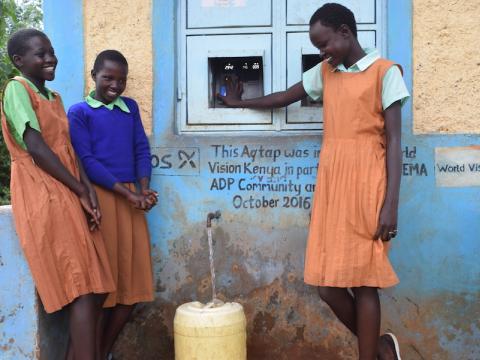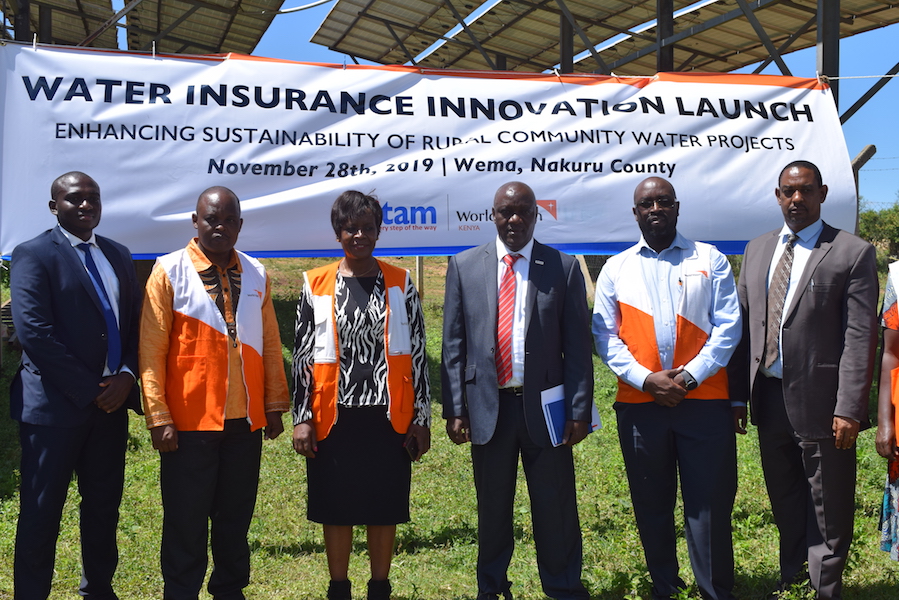New Insurance Innovation aims to Boost Sustainability of Rural Water Projects in Kenya

World Vision, in partnership with Britam General Insurance, has launched a water insurance innovation that seeks to enhance the sustainability of rural water projects.
The innovation, which is the first of its kind in the country, was conceptualised by World Vision and will be serviced by Britam in Kenya.
The insurance programme will shield communities from inconveniences caused by the sudden failure of mechanised water projects through an insurance cover.
The sustainability of rural water systems poses a challenge to many African countries. In Kenya specifically, research has shown that many water projects established for communities in rural areas, especially boreholes, fail after two to three years of operation.
The nature of the failures is usually as a result of malfunctioning pumps or power systems, such as generators.
Through the insurance, communities will be able to address such challenges swiftly, in a cost-effective manner. When components of a water source (such as borehole pumps or generators) break down, the insurer will move in quickly to finance repairs or the replacement of malfunctioning components.

"Most water projects usually function well when they are still being managed by private, non-governmental organisations and other agencies that supported their establishment. But, once they are handed over to communities, many collapse as beneficiaries may be unable to afford maintenance costs involving repairs or replacement of malfunctioning parts," said Enock Oruko, the Associate Director for Water, Sanitation and Hygiene (WASH) for World Vision in Kenya, at the launch of the insurance innovation in Nakuru County (Wema).
He added: "This is a major challenge affecting rural water projects. So we conceptualised the idea of a water insurance that would cushion communities from the high cost of repairs. We then searched for an insurer that was willing to take up the challenge and develop the product. Britam came through."
"This is an area that we want to venture into, as we believe it will make a difference in people's lives," said Daniel Mugao, the General Manager for Britam Kenya.
“We want to assure communities that we will always be there to finance required repairs and replacement of malfunctioning parts of their insured water projects,” stated Mugao.
The premiums will be calculated at 0.75 percent of the total sum of the insured components of the water source, with the minimum charged being Ksh.15,000 annually.
Rural communities will generate the amount from revenues collected by Water Users Committees who usually sell water and manage boreholes on behalf of communities they serve.
Four water projects - using boreholes that serve over 6,000 community members in the Wema area of Nakuru County (Wema) - have already paid the premiums and taken up the water insurance cover. They include: Chepkulul, Mbogoini, Marana and Tuyotich.
"When a pump fails or something breaks, you are forced to part with a lot of money that might not be available at that time. We recently had to pay Ksh.500, 000 when the mortar in our pump stopped functioning, It was a difficult time for the community who stayed without water for nine months before we could raise the funds for the repairs," said Joseph Ongori, the chair of the Wema Umbrella of Water Users Association.
He stated: “Now we have taken the water insurance cover that we are so happy about. If we get problems with our boreholes in the future, we will no longer face financial challenges.”
“We welcome this new water insurance because it will help our communities deal effectively with water problems. As a county, we want to maintain the boreholes we have and not have them collapse due to the unavailability of funds to fix problems that arise,” said Engineer Johnson Kamau, the Nakuru County Director of Water and Irrigation.
The sustainability of rural water projects goes a long way in promoting universal access to safe and clean water that is within easy reach for communities
According to the 2014 Kenya Demographic and Health Survey (KDHS), which has the most current data on water in the country, about 40 (39.2) percent of rural households rely on non-improved sources of drinking water compared to just 10 percent in urban areas.
This predisposes them to a myriad of waterborne diseases, such as diarrhoea and cholera. In addition, communities – especially women and children - are forced to walk over long distances to get alternative water sources.
Indeed, figures from the KDHS show that 40 percent of rural households spend an average of 30 minutes or more (round trip) to obtain drinking water.
Learn more about how the insurance programme will work here.
ENDS
For more information please contact;
World Vision Kenya
Communications Manager,
May Ondeng
Email: May_Ondeng@wvi.org
Britam Kenya
General Manager
Daniel Mugao
Email: dmugao@britam.com